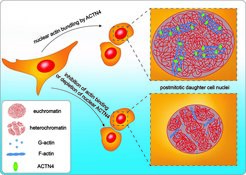Divide and Enlarge
Researchers from Freiburg and Marburg discover a mechanism by which cell nuclei grow

After cell division the nucleus must grow in order to reorganize and unpack the genetic information that is organized in chromatin - the basic genetic material – in order to be able to process and read it. Through their research, the scientists show that bundled actin fibers - normally responsible for exerting force - act inside the nucleus to expand the cell nucleus. Using a video microscope, the researchers have measured on living cells how cell nuclei enlarge immediately after division. High-resolution super resolution microscope, a technique used by Ulrike Endesfelder from the Max Planck Insitute for terrestrial Microbiology, revealed the structure of actin fibers and skeletal structures in the cell nucleus.
In the future, Grosse and his team want to clarify whether mechanical forces act inside the cell nucleus in order to reorganize the genetic information. Such a process could be disturbed or altered in tumor cells, for example, or play a role in stem cells.
Robert Grosse, head of the Institute of Experimental and Clinical Pharmacology and Toxicology (Faculty of Medicine) of the University of Freiburg and collaborates with a group around Dr. Ulrike Endesfelder from the Max Planck Institute for Terrestrial Microbiology in Marburg, Germany, which contributes expertise in super resolution microscopy.
(Patrick Siegert, Press and PR, Albert-Ludwigs-Universität Freiburg)












